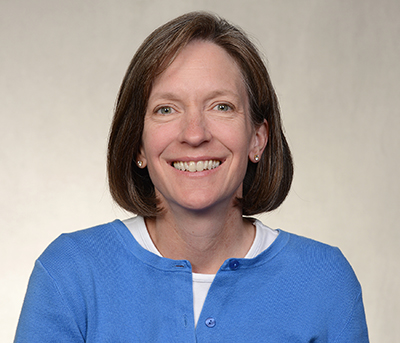Tuesday, Sep 29, 2015
Joan M. Serpico comes to Rider with decades of experience and enthusiasm for research, reading and reaching out
by Aimee LaBrie
Joan M. Serpico, Moore Library's new Assistant Professor I Librarian, comes to Rider from Mount Laurel Library in Mount Laurel, NJ, where she worked as head of adult services.
Serpico earned a master's in library science from the University of Maryland, a master's in teaching from Trinity College and a bachelor's in English from the University of Notre Dame. She has also worked and taught at Rutgers University and the University of Maryland University College.
What do you most want faculty to know about Moore Library?
I would like faculty members to know that we are here to help demystify those complicated sources for their students so that students turn in better projects and are citing resources correctly.
We can actually hold teaching sessions in the library with your students or come to the instructor's classroom. We realize that time is often limited, but we can flexible. We could assist with a whole session or come in for five minutes to help students with one particular aspect of their research.
A professor can come to us and say, "My students are struggling with how to cite sources for their research paper on literary theories of the 20th century" and there's a liaison librarian who can help. We'll adapt our lesson to the amount of time available and the subject matter being covered or researched.
What do you wish students knew about the library?
They should know that all librarians who are working at their reference desks are very interested in helping them. They may have stacks of papers on their desks, but they are always willing to assist students on whatever projecting they're working on.
They should also be aware that they can request a study room in the library. You just have to have two students with their IDs and you can request rooms for two hours. In fact, we now have seven new study rooms where they can meet. These will be particularly useful when students start working on group projects mid-semester.
In addition, there's a 24-hour study lounge located in the front of the library.
What books are on your nightstand at home?
I read mostly fiction, and I recently read All the Light We Cannot See by Anthony Doerr and Mr. Penumbra's 24-Hour Bookstore by Robin Sloan. Some other favorites of mine are The Thirteenth Tale by Diane Setterfield, The Guernsey Literary and Potato Peel Pie Society and The Orphan Master's Son, which was very good, but very dark.
How do you choose what you'll read next?
I use a resource called Library Thing. It's a database where you can put in a book or books that you've liked and the database will suggest other novels that are similar. It's kind of like a Netflix for books. You can sign up and have a personal account that remembers what you've read and enjoyed. I can tell you from personal experience, I always like what they suggest.
Once you start a book, do you always finish it?
No. I don't feel guilty about not finishing a book, but I will give it about 50 or 75 pages before I put it aside. That happened with Toni Morrison's Beloved. I was warned by a friend that it might be difficult at first, but I should stick with it, so I did. And I loved it.
Hard copy or Kindle?
I read paper books, but I do understand the allure of e-readers. They allow people to check out books in the middle of the night that will be returned automatically. Text can be increased in size, so older people or people with vision challenges who may not be able to find large-print books can read whatever they want. They're good if you can't get out of the house, or if you are busy or traveling a lot. Because I work in the library, it's easier for me to get a hold of books, but that's obviously not the same for everyone.
What do you say to students who don't like to read?
Reading first and foremost should be enjoyable, but it can be hard to find out what you like. My advice is to think about a book or a magazine in the distant past that you had found interesting to read, or else it could be a topic that intrigued you, and then talk to a librarian anywhere and just say, "I'm looking for something to read and this is what I've read before that I liked." Librarians are trained to help you find a good match.
Why is reading important?
Oh, there are lots of reasons. It's good for your brain. It can also be a healthy escape or a way to take a break from whatever you might be immersed in at the time. Reading can also introduce you to new ideas, cultures, time periods and people (real and imagined) that can lead you down interesting paths you might not have uncovered any other way.

